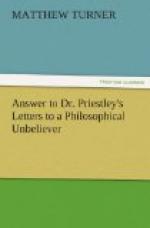and disorder? Besides justice, according to the
only ideas which we can have of it, supposes a fixt
desire to render every one his due. But theologians
constantly preach that God owes us nothing, that the
good things he affords are the voluntary effects of
his beneficence, and that without any violence of
his equity he can dispose of his creatures as his
choice or caprice may impel him. In this doctrine
I see not the smallest shadow of justice, but the
most hideous tyranny and shocking abuse of power.
In fact do we not see virtue and innocence plunged
into an abyss of misery, while wickedness rears its
triumphant head under the empire of this God whose
justice is so much extalled? “This misery,
say you, is but for a time.” Very well,
Sirs, but your God is unjust for a time. “He
chastises whom he loves (you will say) for their own
benefit.” But if he is perfectly good, why
will he let them suffer at all? “He does
it, perhaps to try them” But, if he knows all
things, what occasion is there for him to try any?
If he is omnipotent, why need he vex himself about
the vain design any one may form against him?
Omnipotence ought to be exempt from any such passions,
as having neither equals nor rivals. But if this
God is jealous of his glory, his titles and prerogative,
why does he permit such numbers of men to offend him?
Why are any found daring enough to refuse the incense
which his pride expects? Why am I a feeble mortal
permitted to attack his titles, his attributes, and
even his existence? Is this permission of punishment
on me for the abuse of his grace and favour? He
should never have permitted me to abuse them.
Or the grace he bestowed should have been efficacious
and have directed my steps according to his liking.
“But, say you, he makes man free.”
Alas? why did he present him with a gift of which
he must have foreseen the abuse? Is this faculty
of free agency, which enables me to resist his power,
to corrupt and rob him of his worshippers, and in
fine to bring eternal misery on myself, a present
worthy of his infinite goodness? In consequence
of the pretended abuse of this fatal present, which
an omniscient and good God ought not to have bestowed
on Beings capable of abusing it, everlasting, inexpressible
torments are reserved for the transitory crimes of
a Being made liable to commit them. Would that
father be called good, reasonable, just and kind,
who put a sharp-edged and dangerous knife into the
hand of a playful, and imprudent child, whom he before
knew to be imprudent, and punished him during the remainder
of his life for cutting himself with it? Would
that prince be called just and merciful, who, not
regarding any proportion between the offence and the
punishment, should perpetually exercise his power of
vengeance, over one of his subjects who, being drunk,
had rashly offended against his vanity, without causing
any real harm to him, especially, when the prince
had taken pains to make him drunk? Should we
consider as almighty a monarch, whose dominions were




